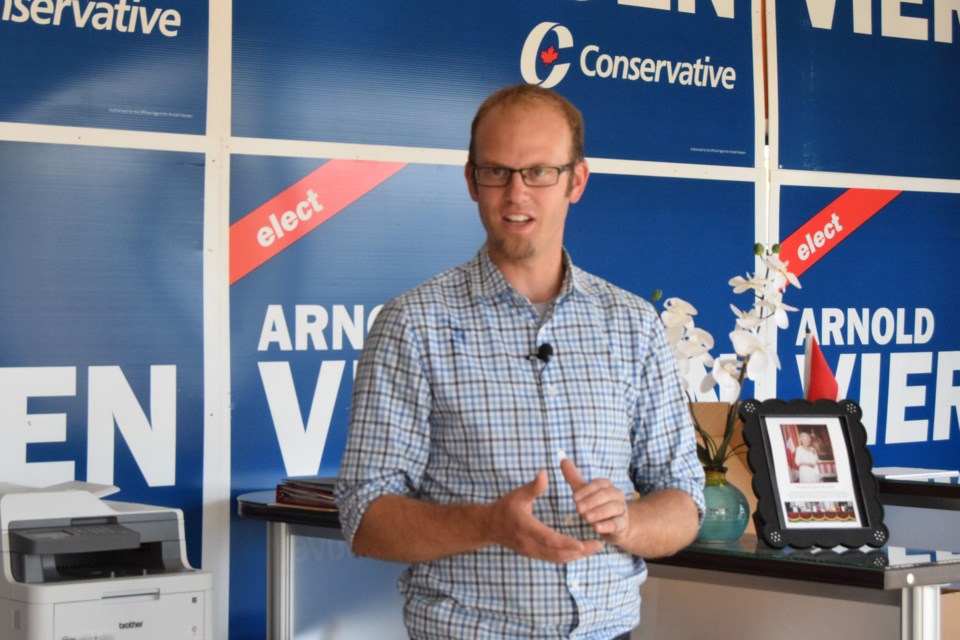BARRHEAD/WESTLOCK-The novel coronavirus has had a devastating impact on thousands of Canadians health and finances.
And the Conservative Party of Canada (CPC) understands that it will cost money to not only combat the virus but to keep individual Canadians and businesses afloat until the economy can recover from the pandemic.
However, Peace River-Westlock MP Arnold Viersen is concerned about the amount of debt the nation is accumulating and that much of the spending is mistargeted.
Last week, Canada's deputy prime minister and finance minister Chrystia Freeland presented their long-awaited fiscal update which included tens of billions in new spending and record debt.
The federal deficit is estimated to grow to over $381 billion in part due to the government's COVID-19 response spending. Since March, the government has spent more than $322 billion on direct aid measures to help fight COVID-19 and protect Canadians throughout the pandemic.
The update outlined just over $25 billion in new spending to top up and expand existing programs and create new, targeted support for hard-hit industries.
Freeland noted that to date, the federal government spending accounted for eight of every $10 spent in Canada to support and/or combat the coronavirus.
The finance minister also announced the government’s intention to launch $70 billion and $100 billion or about three to four per cent of GDP over the next three years to stimulate the economic recovery from COVID-19.
"We are concerned that the Government of Canada is operating off of the Canadian credit card when Canadians would rather have paycheques," Viersen said.
Viersen acknowledged the CPC has supported the government's efforts when they brought in programs such as the Canadian Emergency Response Benefit (CERB), which is now replaced by an enhanced employment-insurance program, and the Canada Emergency Business Account among others.
"While we have supported the government's efforts supporting Canadians, the problem with some of the programs they have rolled out is that they have penalized working," Viersen said. "The wage subsidy that would keep people working has been undersubscribed, with fewer companies being able to access it than we were told would be able to, while CERB has been drastically oversubscribed. We think this because the government failed to design these programs adequately to ensure those that could remain working did remain working."
This is why he said the CPC is asking the government to focus on getting people back to work.
Currently, Canada's unemployment rate is 8.9 per cent, which Viersen noted is the second-worst in the G-7 behind after Italy and is almost double that of the United Kingdom.
As part of the economic update, Freeland reiterated the government's goal to create one million new jobs. It is a pledge they first made during the Speech From the Throne in September.
Viersen said he is also frustrated at the government's apparent plan when it comes to rapid COVID testing and vaccines.
"Other countries will be rolling out vaccines in the next couple of weeks, while the Liberal government doesn't appear to have a clear plan or can tell us when we will be getting vaccines in Canada," he said.
Viersen admitted some of that is out of the government's control as Health Canada has yet to approve any of the vaccines for use and there is not a Canadian producer for any of the front runner vaccines, such as the ones by Pfizer or Moderna. However, he said that does not explain why Canada is so far down the supply list, he said.
"There is no confirmation of a date of when we can expect any of the vaccines and we are still waiting for information about when Canadians can expect access to rapid testing," he said, adding Health Canada has not approved any rapid tests that ordinary residents can access that are available in several other countries.
The Barrhead Leader spoke to Viersen from his Ottawa office on Dec. 2 shortly after he voted virtually on a Bloc Québécois motion, sponsored by party leader Yves-François Blanchet.
The motion calls on the government to acknowledge the extraordinary work of health care workers (including doctors, nurses and orderlies) during the COVID-19 pandemic. It also asks the government to significantly and sustainably increase Canada health transfers to the provinces before the end of 2020.
The motion passed by a vote of 176 to 148 with Viersen and the CPC along with all the other opposition parties voting in favour. Liberal MPs voted against.



